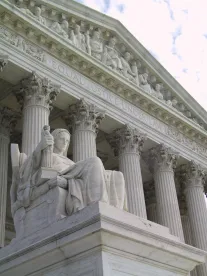In a unanimous opinion on February 19, 2013, the Supreme Court reversed the 11th Circuit in FTC v. Phoebe Putney Health System, Inc. and found that a merger of two Georgia hospitals was not immune from the federal antitrust laws under the "state action" exemption. Writing for a unanimous Court, Justice Sotomayor found that the exemption was not met because the potentially anticompetitive merger was not "the inherent, logical or ordinary result of the exercise of authority" granted to the state subdivision. This latest of many Court opinions to explain the exemption should provide clearer guidance to municipalities and even private actors exercising authority granted by a state.
In this case, the Hospital Authority of Albany-Dougherty County, established pursuant to a 1941 Georgia law, has owned and operated Phoebe Putney Memorial Hospital for decades. In 2010, the Authority authorized the purchase of the other hospital in the county, Palmyra Medical Center. In April 2011, the FTC sought to block the merger but both the district court and the 11th Circuit denied the injunction request under the "state action" exemption.
That exempts actions by a state as sovereign from the federal antitrust laws. Subdivisions of a state, such as the Hospital Authority, however, are not sovereign and their actions are immune from prosecution only if the state legislature "clearly articulated" a policy to displace competition. If private parties are implementing the policy, those parties also must be "actively supervised" by the state itself.
Both the district court and the 11th Circuit found that the Georgia law's delegation of general corporate powers to hospital authorities, including the power to acquire other hospitals and similar "projects," was a clear articulation of a policy to displace competition because such mergers were, as earlier Court opinions had required, a "foreseeable result" of the legislation. The two courts found that standard was met because the anticompetitive conduct could be "reasonably anticipated" by the legislature. Neither court thought it necessary that the anticompetitive effect be one that was inherently likely. In their briefs and at oral argument, the hospital parties had added that the delegation of these general corporate powers in the unique context of the State's objective of providing affordable health care for all its citizens made potentially anticompetitive mergers even more easily foreseeable. The FTC, on the other hand, relied on other language and other Court cases to argue that to meet the "clear articulation" standard, the conduct must be a "necessary" or "inherent" result of the legislative action.
The Court agreed with the 11th Circuit and the hospital parties on the significance of foreseeability but found that the Court applied the concept "too loosely." The Court confirmed that it would not require the legislature to explicitly authorize specific anticompetitive effects before applying the exemption. The Court, however, summarized its past "clear articulation" opinions as requiring the anticompetitive effects to be "the inherent, logical, or ordinary result of the exercise of authority delegated by the state legislature." Here, the Court did not see the "simple permission to play in the market" supplied by the general corporate powers as meeting that standard. Those same general corporate powers, including the power to acquire other hospitals, were delegated to all Georgia corporations. They could be used by the hospital authorities and any Georgia corporations in many procompetitive ways and would not "ordinarily produce anticompetitive effects."
The Court accepted the argument of the hospital parties that public, nonprofit entities like the Hospital Authority differ materially from private corporations that offer hospital services. Still, any such differences did not logically suggest that the legislature intended the hospital authorities to meet their objectives through anticompetitive means. A clear articulation of such a policy was still required and not present here. Even the legislative authorization of certain limits on competition — such as through the certificate of need requirements before the addition of additional health care capacity — did not mean the State affirmatively contemplated other forms of anticompetitive conduct.
Finally, the hospital parties contended that federal courts, if in doubt, should err on the side of recognizing the immunity to avoid undue interference with state policy choices. The Court soundly rejected the contention, both because it had little doubt here as to the proper application of the exemption's requirements and because of its numerous prior statements that a finding of "state action immunity is disfavored."
Given the Court's decision on the clear articulation test, it found no need to reach the question of whether the participation of certain private hospital entities in the merger triggered the need to see if their actions were "actively supervised" by the state.
This opinion helps clarify the "clearly articulated" prong of the state action exemption for subdivisions of states as well as private parties (who must also meet the "active supervision" prong of the exemption). To qualify as clear articulation, the action of the state legislature must explicitly recognize the possibility of anticompetitive effects or inherently, logically or ordinarily lead to such results. Mere expressions of neutrality by the legislature will not suffice. Municipalities or private parties would be wise to confirm that the legislative delegation under which they are acting meets that standard.


 />i
/>i

